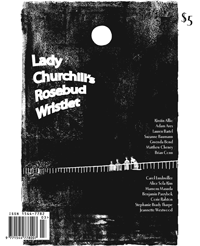Follow Scott
Recent Tweets
- Waiting for Twitter... Once Twitter is ready they will display my Tweets again.
Latest Photos
Search
Tags
anniversary Balticon birthdays Bryan Voltaggio Capclave comics Cons context-free comic book panel conventions DC Comics dreams Eating the Fantastic food garden horror Irene Vartanoff Len Wein Man v. Food Marie Severin Marvel Comics My Father my writing Nebula Awards Next restaurant obituaries old magazines Paris Review Readercon rejection slips San Diego Comic-Con Scarecrow science fiction Science Fiction Age Sharon Moody Stan Lee Stoker Awards StokerCon Superman ukulele Video Why Not Say What Happened Worldcon World Fantasy Convention World Horror Convention zombies
©2025 Scott Edelman
The most irritating thing I’ve read so far this year
Posted by: Scott
Tags:
magazines
Posted date:
January 11, 2008 |
No comment
The Fix has just run a review of the November 2007 issue of Lady Churchill’s Rosebud Wristlet which contained a sentence that raised my hackles. (Not a pretty sight.) Reviewer Martin McGrath started off his piece by tackling the very title of the magazine, stating that “Pretensions to literary stylings would seem to be a certainty, but does the obscure title also hint at a deliberately obscure approach to story and language?”
Personally, I’ve always felt LCRW‘s title to be whimsical rather than obscure, but no, that wasn’t what bothered me. The sentence that irritated me was still to come. McGrath continued by stating:
There are those writers whose primary purpose is to communicate with their readers, to tell a story, make a point, or engage in a conversation, and there are others who seem primarily concerned with demonstrating the range of their command of the English language and the scope of their intelligence.
My immediate response to this statement was to think—where are these writers who are just trying to show off how smart they are, who care nothing about touching readers? Because I’ve never met them.
All writers, whether easy or difficult to comprehend, whether transparent or opaque in their prose, are trying to communicate. I’ve yet to meet one of these more complex writers whose personal goals have been to obfuscate deliberately—it’s just that they feel that the content and themes they want to communicate can only be shared in a more complex way. As I think of writers who’ve at times been labeled difficult—people such as Barry Malzberg, Tom Disch, Samuel R. Delany, John Crowley, Ursula K. Le Guin, Gene Wolfe and on and on and on—none of them have chosen to be McGrath’s latter sort of writer rather than the former. That’s just the way they are. Yes, their audiences might have been larger if they’d chosen to write in a simpler way (if choice is even an option), but by changing the manner in which they write they’d also be changing the message. The things they have to say can only be said in the manner in which they say them.
Even James Joyce, when writing Finnegans Wake, wasn’t aiming at merely showing off. He told his tale the way he thought it demanded to be told:
I can’t understand some of my critics, like Pound or Miss Weaver, for instance. They say it’s obscure. They compare it, of course, with Ulysses. But the action of Ulysses was chiefly during the daytime, and the action of my new work takes place chiefly at night. It’s natural things should not be so clear at night, isn’t it now?
I’ll admit that I’ve tried to read Finnegans Wake many times, and have failed each time. But that doesn’t mean that Joyce didn’t hope that I’d succeed. Writers write in many different ways. But even the most apparently opaque hope to be understood. They may be understood by fewer, but I truly believe that the hope is always still there.
I think McGrath is misreading motives here. But at least he writes only that they “seem primarily concerned” rather than that they “are primarily concerned.”
To McGrath’s credit, he then goes on to rave about the contents of the issue, which makes the reference to all those supposedly artsy-fartsy writers more difficult to comprehend. This straw-man argument takes away from an otherwise insightful review.
If you think I’m wrong, if there truly are writers out there struggling not to be understood, please point them out to me. Maybe I’m the one who’s misreading motives. But I don’t think so.

